New Middle Ages
1 total work
This book studies medieval attitudes towards the ventriloquism of God's and Christ's voices through human media. It includes readers, who ventriloquized the divine voice when speaking the words of the Bible; pagan oracles, which become appropriated as organs for the divine voice; priests, who are the designated media for conveying the divine voice in preaching, confessions, and the liturgy; lay speakers, who unlawfully appropriate the clerical voice and, by extension, God's voice, by speaking words that do not pertain to them; bodily sources other than the mouth, such as when a churlish lay person utters divine speech through a fart; and actors on stage, who ventriloquized Christ's words spoken at the Last Supper. Simply put, the essence of each of these ventriloquial acts is that they relocate the voice from its conventional source in the speaker's mouth, in this case, in ore Domini, to a mortal medium. Taken together, these chapters tell a story, one of a progression from an orthodox view of divine vocal power to an anxiety over the authority of the priest's voice to a subversive take on the divine voice that foreshadows Protestant devotion.
Although the primary audience for the book will be medievalists, it also makes a contribution to the burgeoning field of the history of the senses, in particular, sound theory, and thus will be helpful to any scholar who studies the voice and vocal performances.
Although the primary audience for the book will be medievalists, it also makes a contribution to the burgeoning field of the history of the senses, in particular, sound theory, and thus will be helpful to any scholar who studies the voice and vocal performances.
